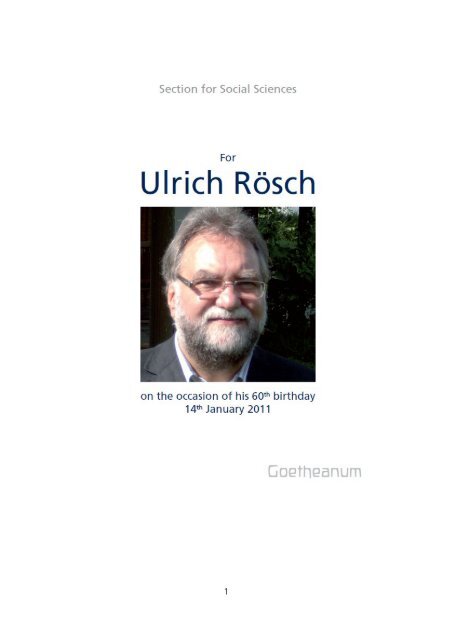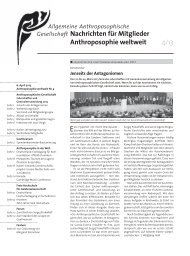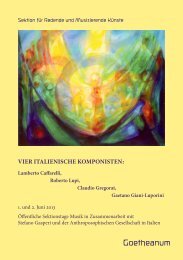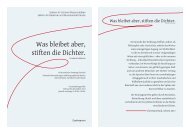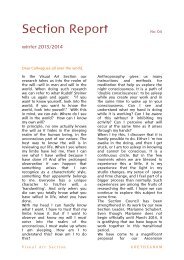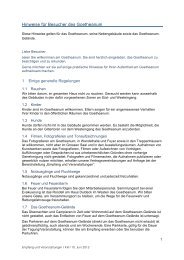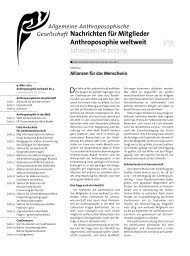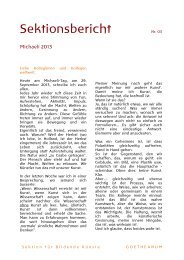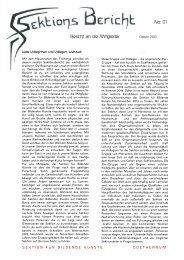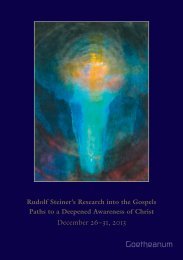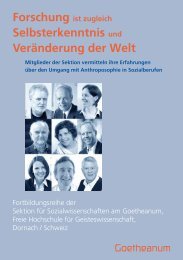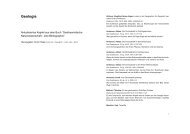For Ulrich Rösch - Goetheanum
For Ulrich Rösch - Goetheanum
For Ulrich Rösch - Goetheanum
Create successful ePaper yourself
Turn your PDF publications into a flip-book with our unique Google optimized e-Paper software.
<strong>For</strong> <strong>Ulrich</strong> <strong>Rösch</strong><br />
Autor Page<br />
Paul Mackay 4<br />
Hans Dackweiler 5<br />
Aban Bana 7<br />
Anna Kurbarova 8<br />
Anežka Janátová 8<br />
Ute Craemer 9<br />
Christoph Klipstein 10<br />
Dietrich Spitta 15<br />
Peter Lüdemann-Ravit 16<br />
<strong>Ulrich</strong> <strong>Rösch</strong> 21<br />
Many thanks to Hanna Koskinen. She collected these texts and encouraged the<br />
writers to contribute. This will at the same time be the end of a ten years long<br />
fruitful collaboration.<br />
Now we both are very excited to learn, what the future will bring to us.<br />
photos on the left side:<br />
1. lecture in Bangalore for the Bio-dynamic Association India (BDAI), 2009<br />
2. with the 98 years old father of Aban Bana in Mumbai, India<br />
<strong>Ulrich</strong> <strong>Rösch</strong><br />
3. at the conference in Prague 2008 "The Soul of Europe" (with Mathieu van<br />
den Hoogenband, Hans Hasler and Peter Selg)<br />
3
Paul Mackay<br />
<strong>Goetheanum</strong><br />
<strong>For</strong> me, <strong>Ulrich</strong> <strong>Rösch</strong> is someone who lives faithful to the idea. Earlier in his life<br />
through Wilfried Heidt he met the idea of the threefold social order as an<br />
organism. Then, through Wilhelm Schmundt and Joseph Beuys he met again<br />
and internalised this idea. This allowed him to recognise this idea faced by social<br />
reality. He is a talented phenomenologist. Moreover, he has an exceptional<br />
talent for education and method. In an exemplary manner, he knows how to<br />
lead his listeners to the idea of the threefold order of the social organism. It is a<br />
pleasure to listen to him. You are led immediately into a world of pictures and<br />
of social relationships that allow you to experience the reality of powers at work<br />
in social life.<br />
I still see fresh before me my first meeting with <strong>Ulrich</strong> <strong>Rösch</strong>. It must have been<br />
a meeting of the Social Science Section in the early ’80s of last century, when he<br />
was asked by Wilhelm Schmundt to give his view of the threefold order. Already<br />
then I was impressed how he formed his contribution.<br />
When <strong>Ulrich</strong> <strong>Rösch</strong> became a colleague of Manfred Schmidt-Brabant in 1999, a<br />
fruitful collaboration began, which, as successor in leading the Section, it has<br />
been my pleasure to continue.<br />
Dear Uli, for our collaboration, which I value very highly, I would like to express<br />
my warm thanks. May there be many opportunities out of your faithfulness, for<br />
you to introduce the idea of the threefold social organism to many, especially<br />
young people!<br />
4<br />
Yours, Paul<br />
English by Alan Stott
Hans Dackweiler, Deckenpfronn<br />
<strong>Ulrich</strong> <strong>Rösch</strong> has attentive eyes. He takes notice of people. He observes their<br />
appearance, how they move, but above all how they behave towards each<br />
other. He follows social interaction.<br />
It can happen that he keeps quiet for a long time during meetings, although a<br />
contribution from him would be helpful; he is silent and observes. He exudes<br />
calmness, since his gaze is not disturbing. What he weighs up concerns the<br />
questions under discussion, and also relates to the people concerned. These<br />
concerns always look at what wants to come about between people. He lives in<br />
what wants to become.<br />
I got to know him in the middle of the ’70s of last century. He was visiting the<br />
master-weaver in Lautenbach and asked her whether she could weave a stole<br />
that was to go with a dress of the Rakattl collection. Frau Peters, the weaver,<br />
could indeed weave the piece, but only at a price that would exceed a successful<br />
prospective marketing. This is one of the greatest problems facing production in<br />
Europe. <strong>Ulrich</strong> stood by Frau Peters, whose view was justified. He weighed up<br />
the question and finally saw he had to order the woven part from South-East<br />
Asia.<br />
This was my first impression – a businessman who plans carefully. The second<br />
impression concerned the lady’s dress to which the woven stole should belong.<br />
It was beautiful; it had style. It was made out of natural material, had a simple<br />
pattern, and created a form for the person who would wear it. <strong>Ulrich</strong> <strong>Rösch</strong><br />
recounted that Rakattl is a firm whose products are made in the Wangen<br />
Waldorf School. The first product was a doll, then came dresses for women and<br />
children. These are beautiful items.<br />
<strong>Ulrich</strong> <strong>Rösch</strong> with others founded the Wangen Waldorf School and worked<br />
there for many years. He taught, and has carried the responsibility of the<br />
school’s new building. With all the calmness that he emanated – here he was<br />
not an observer, but someone intensively active.<br />
These activities of the will were supported during the years of collaboration in<br />
Achberg, a centre for the study and research on social questions. Here <strong>Ulrich</strong><br />
worked on decisive directions in his professional life. On 22nd August 1968, at<br />
17 years old, he meets Wilfried Heidt in the market-place in Lörrach. It is the day<br />
after the Russians marched into Prague. Since then he has been close to Wilfried<br />
Heidt. He became his pupil, and accompanied him to Achberg, near Lake<br />
Constance. There with others they founded a centre for social science that was<br />
to carry the name Achberg. Other founding members are Peter Schilinski, and<br />
Jutta and Fred Lauer.<br />
He studied Wilhelm Schmundt’s social scientific works. A world of ideas opened<br />
up. He meets Joseph Beuys, whom he initially only knows as a threefolder, not<br />
5
as a visual artist. This side of his work he only met after Joseph Beuys’ death.<br />
In 1999 <strong>Ulrich</strong> was invited to come to the <strong>Goetheanum</strong> in Dornach. There he<br />
worked first with Manfred Schmidt-Brabant, then with Paul Mackay, Leader of<br />
the Social Science Section at the <strong>Goetheanum</strong>. There I came into contact with<br />
him again in a working group dedicated to the study of conflict. The group<br />
consisted of advisors in conflict situations, lawyers and others interested in such<br />
issues.<br />
Here <strong>Ulrich</strong>’s nature and way of working was evident. He listens, observes; he<br />
intensively follows the thinking. He avoids appearing as the one who decides<br />
and leads. Yet thoughts emanate from him that connect to what wants to come<br />
about in the group. Humour, too, flashes up repeatedly.<br />
<strong>Ulrich</strong> is often in Prague, speaking with the people, holding lectures; a large<br />
conference is organised. It is moving to experience how <strong>Ulrich</strong> speaks about the<br />
people of this country. His heart opens when he tells of their openness, their<br />
spiritual search and above all of their warmth of heart. <strong>Ulrich</strong> also travels to<br />
other places, taking note of people; he holds lectures. The people of Eastern<br />
Europe are especially close to him.<br />
I look at events in which he was involved. I see how he works in movement and<br />
in speech. I look at the people in whose social context he stands and I see<br />
concrete things. I look a little beyond the surface, hoping to approach the<br />
essence of this human being.<br />
I perceive new things arising through people. This is what deeply moves <strong>Ulrich</strong>.<br />
A realm opens up which is not prescribed; something new, completely new, is<br />
coming into being. Human beings together fashion something which humans<br />
create, leaving their mark on the spirit of our times. That is one thing that I<br />
perceive.<br />
The other realm is not easily put into words. It belongs to <strong>Ulrich</strong>’s inner being. I<br />
receive the impression that here is the source out of which <strong>Ulrich</strong> draws when<br />
he weighs up that which leads him to people, what he wants to carry into their<br />
midst. I will describe it with the name – justice. <strong>Ulrich</strong> would like to contribute<br />
towards the essence of the human being.<br />
<strong>Ulrich</strong> has read what I have written and complains: I am not like this! I also have<br />
sharp corners and weaknesses! I am sure he is right. But I have not directly<br />
experienced them.<br />
Is that what makes a human being, his lighter and darker sides? What deeper<br />
levels are reached by the good side, and what by the less good? It seems to me<br />
that there are streams of being which point towards the future; others belong<br />
to the past. I have attempted to mention the former.<br />
Hans Dackweiler, Dorfgemeinschaft Tennental, Deckenpfronn<br />
English by Alan Stott<br />
6
Aban Bana<br />
Mumbai, India<br />
My sister Dilnawaz and I have known <strong>Ulrich</strong> <strong>Rösch</strong> and his wife Cornelia for<br />
many years. We have met them in Europe as well as in India. They have a special<br />
connection to India, which they have visited on a regular basis for many<br />
years. <strong>Ulrich</strong> has been active in the Anthroposophical movement in India; he has<br />
visited many of the initiatives like Waldorf Schools, Biodynamic Farms, Camphill<br />
Homes, Branches and institutions and has met most of the members! It is always<br />
a joy to welcome him in our country.<br />
One pleasantly memorable episode, which I would like to recall, was during the<br />
Christmas holidays 2008. <strong>Ulrich</strong> was at our home in Grant Road, Mumbai, at a<br />
meeting of our Gateway Branch, where the branch members representing six<br />
religions were assembled. In spite of the incessant traffic noise, <strong>Ulrich</strong> gave a<br />
talk on the deeper meaning of Christmas and the social impulse. It was such an<br />
intense atmosphere, that our 98 year old father, who was still alive then, was<br />
deeply touched as were also the members present in the group. We are glad<br />
that this year he will be back in Mumbai, again at Christmas time.<br />
Next year <strong>Ulrich</strong> will celebrate his 60th birthday, three days before mine. We all<br />
wish him Happy Birthday and many happy returns to India.<br />
With best wishes,<br />
7<br />
Dilnawaz and Aban Bana<br />
Mumbai, India
Anna Kurbarova<br />
Kharkiv, Ukraine<br />
With warmest greetings I would like to congratulate <strong>Ulrich</strong> with his birthday. I<br />
am very happy that I have possibility to work with such experienced and kind<br />
advisor. During our work I have learned literature about ideas of social threefolding.<br />
Also during my studies at the <strong>Goetheanum</strong> I was happy to take part in his<br />
workshop.<br />
Especially I was impressed by the conference `Soul of Europe' in Gdansk,<br />
Poland, where lots of people from different countries gathered together and<br />
discussed different themes concerned with solidarity of european people and<br />
shared their experience.<br />
I am looking forward to work in our international research group and I would<br />
like to wish <strong>Ulrich</strong> good health, happyness and harmony in his family and inspiration<br />
for his further research work.<br />
Kind regards,<br />
Anežka Janátová, Praha Czech Republic<br />
My dear Hanna,<br />
My dear Uli,<br />
Kurbarova Anna<br />
Kharkiv, Ukraine<br />
on the last weekend we had in Prague already our third congress related to the<br />
rose cross; "The rose and the cross". My thoughts were very strongly with you.<br />
It would have been marvelous, if you also could have been here with us. It<br />
would give courage to both of you. It concerned the actual heavy times, and St.<br />
Michael and Christ. We came down to earth for these hard times.<br />
And so we have enough power for our fights. It is important, to have a sun sign<br />
before our chest . Because all arrows, which aim at us, go through and the angel<br />
behind us already knows, what is to be done thereby.<br />
8<br />
Anežka Janátová, Praha
Ute Craemer<br />
Monte Azul, Brasilien<br />
Dear <strong>Ulrich</strong>,<br />
Congratulations on your birthday. Muitas felicidades e principalmente saúde<br />
We got to know one another better at the Fórum Social Mundial in Porto Alegre<br />
(Brazil), the great forum of all civil-society activities and often also merely great<br />
slogans. Particularly impressive were Leonardo Boff, the Indian NGOs, the<br />
minorities and of course also the many Brazilian social movements such as<br />
Movimento Sem Terra, the minorities and especially also the Monteazul Group.<br />
We were walking past your stand and it immediately attracted our attention as<br />
it was not only discussion that went on there but artistic work. Members of the<br />
<strong>For</strong>um were able to work through the masses of information and the many<br />
impressions by working with colours. This creates a very quiet yet dense<br />
atmosphere. After the <strong>For</strong>um you still had enough energy to give a talk for the<br />
Anthroposophical Society.<br />
These shared experiences no doubt provided the basis for our collaboration at<br />
the Social Sculpture – Monteazul Conference at the <strong>Goetheanum</strong> in the autumn<br />
of 2008. I was a major event – controversial, fascinating, and deeply moving.<br />
We were sometimes more and sometimes less successful in relating the different<br />
approaches - thinking to doing, doing to thinking – mainly thanks to art and<br />
with the thinking of the heart. Symbolically this came to expression when about<br />
300 people embraced the <strong>Goetheanum</strong> by tying a ribbon of love around the<br />
building as they danced and sang.<br />
Some important words spoken at the Conference:<br />
It is the human being who matters.<br />
The more you give yourself, the more life do you gain (Monte Azul)<br />
Genuine social science is based not on something I study<br />
but on something which another reveals to me. (Rudolf Steiner)<br />
Thus I can well imagine that the planned 'Social <strong>For</strong>um with spiritually inspired<br />
initiatives' may fill you with enthusiasm.<br />
All the best for the future.<br />
Ute Craemer, Monte Azul, São Paulo/Brazil<br />
9<br />
English by Anna R. Meuss
Christoph Klipstein, Achberg-Liebenweiler<br />
1 Early days in Achberg<br />
In the early 70s of the 20th century we would have a staff meeting every<br />
Monday evening in Humboldt House at the International Cultural Centre in<br />
Achberg (INKA). <strong>Ulrich</strong> Roesch was one of the younger people among us. I had<br />
got to know him as a student on the teachers' training course who was full of<br />
enthusiasm for the idea of a social threefold order and had moved from<br />
Loerrach to Achberg following Wilfried Heidt, the important co-initiator and cofounder<br />
of INKA (e. V. = reg. charity). We were a mixed group, youthful idealism<br />
and the long experience of life of the 'old hands' came together, and we talked<br />
about God and the world, cleaning services, house rules, work in the kitchen<br />
and tea room, about the situation after the Prague Spring and the year 68 in<br />
Germany and Western Europe, as well as preparations for meetings and<br />
conferences. Those first meetings gave wings and enthusiasm to <strong>Ulrich</strong> Roesch<br />
and the rest of us. Just as young children delight their parents, so the early stage<br />
of a new enterprise can be a wondrous thing – everyone has equal rights,<br />
making their own free decisions and discussing and deciding together on<br />
everything on the agenda. Insight into the need for differentiation, for<br />
responsibilities and spheres of competence would later on lead to crises and<br />
important learning processes.<br />
2 Preparations for the future Wangen Waldorf School<br />
The establishment of a Waldorf school was one of the aims at Achberg<br />
International Cultural Centre. Some of us therefore established the 'Freie Schule<br />
Achberg – Waldorf Schule e.V.' Association, and so it came about that quite out<br />
of the blue I found myself to be the chairman of the association, for having<br />
attended a Waldorf school myself I had been class teacher at a secondary school<br />
in the Allgaeu region after I had moved to Achberg. Soon after this Uli Roesch<br />
became a member of the council as well. He devoted himself with energy and<br />
inner commitment to the work of preparing for the establishment of the school.<br />
Having completed his teachers' training at Weingarten, he was class teacher at<br />
the secondary school in Niederwangen near Wangen, gaining his initial<br />
experience as a teach at a 'normal' state school, like myself. Meanwhile an<br />
initiative group of future teachers at our Waldorf school had come together.<br />
When my father, Hermann Klipstein, came to Achberg from Hibernia School in<br />
Wanne Eickel in the holidays, he would work with us on The Study of<br />
Man/Foundations of Human Experience. His second wife, Roswitha Klipstein,<br />
would do speech work with us. Both were later to work at the Wangen School,<br />
10
my father then in his retirement. <strong>Ulrich</strong> Roesch was very much part of the<br />
initiative group, making a major contribution in holding it together with his<br />
talent for organization, preparing for and following up our meetings. At a<br />
weekend meeting of the group inthe 'Steinknickle' in the Swabian hill country<br />
we decided that I would only join the future faculty some years later (following<br />
Helga Latanowitz), since I was still very much involved in other, wider spheres of<br />
work at the Achberg Cultural Centre. I lived through a number of tight<br />
situations, being something of a Jack of all trades in my youthful innocence. I<br />
therefore cut down on my activities in founding the school. <strong>Ulrich</strong> Roesch, on<br />
the other hand, was wholly involved and committed to the enterprise.<br />
Came the time when we needed a founding teacher. The German Waldorf<br />
School Association would not accept my father for this, saying that he was<br />
retired and too old for the burdens of such a post. Nor was <strong>Ulrich</strong> Roesch<br />
accepted, for being too young and lacking experience. Our ideas and experience<br />
also did not go exactly in the direction of having a single individual as the<br />
Association-approved founding teacher. An autonomous faculty style had<br />
already developed, with the school's affairs managed wholly on our own<br />
responsibility. The problem then became a plus for us, with the evolving faculty<br />
deciding that the two should take responsibility for the post together. <strong>Ulrich</strong><br />
Roesch and my father were accepted as a founder teacher team by the<br />
Association. And this team spirit turned out to be a blessing for the further<br />
development of the school.<br />
Sponsorship of the Waldorf school in Ulm was sought in vain at this time, and<br />
so, too, that of the Ueberlingen Waldorf School, in our very own, unorthodox<br />
founder style, though a working relationship with them had started to develop<br />
by then. In the end, Manfred Leist and Stefan Leber from the Board of the<br />
Association of Independent Waldorf Schools had to be our personal sponsors, a<br />
new development in the Waldorf school movement. Later these two 'important'<br />
gentlemen asked Lotte Ahr to join them as educational adviser.<br />
3 Anthroposophical Society in Wangen<br />
At Michaelmas 1972 those of us who wished became members of the<br />
Anthroposophical Society, Folkert Wilken from the Oberrhein Centre providing<br />
the references for the 'Achbergers'. A relatively small group of us met for the<br />
regular group work – <strong>Ulrich</strong> Roesch, Peter Schata and I were the younger<br />
members, Jutta and Fred Lauer and Elise Kaspers (during the times when she<br />
came to Achberg from Milwaukee and Paris) the older members of long<br />
standing. In the personal and dignified atmosphere of the Lauer home our small<br />
group functioned as 'our own branch leader', working together in a continuous,<br />
intensive and dense way.<br />
11
4 Wilhelm Schmundt<br />
This was also the time when we in Achberg met and began to work together<br />
with Wilhelm Schmundt, and Joseph Beuys also soon joined us. Wilfried Heidt<br />
had originally arranged with Ruespe Study Centre that Wilhelm Schmundt<br />
would come to talk to us. And so it came about that in a room off the main<br />
auditorium of Humboldt House we, the younger members in Achberg, from the<br />
student movement of 1968, were, well, not exactly lounging but certainly at<br />
ease on our seats, and before us stood Wilhelm Schmundt, erect, friendly and<br />
calm, with a subtle inner fire, wearing a formal dark suit, and developed his<br />
ideas, the basics of which he had published earlier with the publishers of the<br />
School of Spiritual Science under the title Der soziale Organismus in seiner<br />
Freiheitsgestalt (the social organism configured in freedom). Using coloured<br />
chalks, he carefully and slowly drew the curved lines of the different money<br />
streams on the board. Wilfried Heidt and Peter Schilinski were not prepared to<br />
accept him at first. As far as I know Peter Schilinski has not changed his views<br />
much in this direction, but Wilfried Heidt later made Schmundt's ideas his own<br />
with enthusiasm.<br />
With <strong>Ulrich</strong> Roesch, the consequence was that he managed to get permission to<br />
write about Schmundt's ideas in his final paper at Weingarten College of<br />
Education: 'Die monetaeren Prozesse in der modernen Industriegesellschaft' (the<br />
monetary processes in industrial society), and I, the Waldorf school student, was<br />
able to assist in giving the illustrations artistic form. Later, when Wilhelm<br />
Schmidt was again presenting his ideas to a larger audience at the 'Third Way'<br />
annual conference in Achberg, using coloured chalks, he referred with some<br />
pride to 'Mr Roesch, my assistant'. And <strong>Ulrich</strong> Roesch stood beside him, with the<br />
longer hair of the time of 1968, in a suit of green cord, and with a long pointer.<br />
Stepping forward calmly, 'dignified' and with a slight smile, he would point to<br />
the areas of the money streams under discussion with the same care as had<br />
gone into drawing them.<br />
5 Nobody is perfect<br />
We had to learn in our spheres of work that the ideals of the Social Law, and<br />
also Schmundt's ideas, are not that easily implemented one to one in reality.<br />
Antisocial impulses tend to arise not only in theory and not only in others as the<br />
spiritual soul develops. Some of us felt that <strong>Ulrich</strong> Roesch seemed rather<br />
domineering in his leadership style, tending to go his own way. Yet he was<br />
shouldering much all by himself, and in some situations, though not in all, going<br />
it alone may have been the only option open to him if anything was to happen<br />
at all. I on my part found his management, and the financial management of<br />
the young school not exactly 'revolutionary' if one considered our original ideals.<br />
I was working on the concrete caissons for the new school at the time and had<br />
12
a good, close relationship with the other building workers. A proposal I made -<br />
today I realise it may not have been without a dash of 'moralic acid' to it - was<br />
rejected by the faculty who did not understand it at all - it was to tell the<br />
workers about the Waldorf school during their paid working hours and invite<br />
them to our monthly festivals, for example. Their idea that if they were really<br />
interested they might take up offers made by the school in their free time simply<br />
was not in accord with the reality of a hard day's work and frequent overtime.<br />
Conflict and hurt feelings arose among the faculty at that time.<br />
One one occasion when after a faculty meeting <strong>Ulrich</strong> Roesch came into Adolf<br />
Tiedemann's office (who was in charge of the building site and the school's own<br />
building firm at the time), the latter asked him laconically if he had not been<br />
able to stand all that head-nodding. But attempts were made to introduce the<br />
building workers to the principles of Waldorf education and the threefold social<br />
order over a glass of beer and a bite once a month.<br />
I once complained to my 75-year-old father about the faculty in general and<br />
<strong>Ulrich</strong> Roesch in particular. His response was that I had failed to make myself<br />
fully part of the faculty at the given time. He added with humour, lovingly and<br />
with some resignation that he, too, sometimes felt he was 'Mr Roesch's<br />
assistant'.<br />
In theory my critical attitude at the time was no doubt right in many ways. In the<br />
art of social development as presented by Schiller in his On the Aesthetic<br />
Education of Man, speaking of the clockmaker who quickly replaces a small<br />
wheel with practised skill, so that function does not stop for even a moment in<br />
that clock of inadequacies - in that art we are still very much at the beginning.<br />
<strong>Ulrich</strong> Roesch simply went ahead in the way he was able then, consistently,<br />
faithfully and with growing competence, and Fred Lauer, business manager of<br />
INKA e.V. at the time, gave him much valuable support. And in the inadequacies<br />
of the 'Wangen clock' the young Waldorf school came into existence and<br />
proved viable.<br />
I did not at the time succeed in finding my place in the Wangen faculty, and<br />
continuing my work in other spheres of work in the Achberg context seemed<br />
pointless by then, so I followed a call to be a class teacher at the Rudolf Steiner<br />
School in Hamburg Wandsbeck.<br />
We went our separate ways then, and my collaboration with <strong>Ulrich</strong> Roesch<br />
stopped – for about 33 years!<br />
6 Today and tomorrow<br />
Many years later, when on holiday in the Allgaeu region, <strong>Ulrich</strong> Roesch invited<br />
us to a meeting. And the impulses of the early work in Achberg were still alive in<br />
us. Further meetings showed that other friends from that time in Achberg felt<br />
13
much the same.<br />
And so we have been meeting continually at somewhat extended intervals for<br />
about five years now, a group sharing our thoughts and talking about the<br />
original Achberg founding impulse in a 'kind of conference'. (Ingrid Dernte,<br />
Gerald Haefner, Christoph Klipstein, Henning Koehler, Jutta Lauer, <strong>Ulrich</strong><br />
Roesch, Martin Roesing, Alfred Wohlfeil on a regular basis, others such as<br />
Monika Klipstein, Dorothe Koehler, Ingrid Litze, Claudine Nierth and Rainer<br />
Rappmann joining us sporadically). Wilfried Heidt, to whom we are all, each in<br />
his own way, much indebted because of that earlier collaboration, does not take<br />
part in these meetings. Without wanting to go so far as speaking of a tragedy, it<br />
seems that it is not possible for us to collaborate with him at present.<br />
To perceive and sense what the events of our time demand of us with their<br />
global crises is one of our concerns, brought forward again and again in the<br />
group by <strong>Ulrich</strong> Roesch. What preparations can be encouraged so that when the<br />
situation of our age opens up and the call comes, loudly and clearly, for<br />
solutions to the global social issue, there will be enough people who spiritually<br />
will not be found wanting?<br />
We deeply regret that for financial reasons <strong>Ulrich</strong> Roesch will no longer be able<br />
to continue his work on these issues in the Social Sciences Section. <strong>For</strong> we feel<br />
that right now this Section is the most important for the time being in the work<br />
at Dornach. And we will not give up hope that in the not too far distant future<br />
the Social Sciences Section at the <strong>Goetheanum</strong> will be able to take up and<br />
continue the work on the issues which <strong>Ulrich</strong> Roesch also represents, with the<br />
necessary financial provision and a greater number of workers.<br />
My wish for <strong>Ulrich</strong> Roesch is that in future, too, he will be able to work for his<br />
and our concerns, and we look forward to continued collaboration.<br />
Christoph Klipstein, Achberg-Liebenweiler<br />
14<br />
English by Anna R. Meuss
Dietrich Spitta<br />
Filderstadt<br />
Dear Uli,<br />
<strong>For</strong> your 60th birthday I wish you very warmly all the very best. It is now a few<br />
decades since we have met and collaborated in the Social Science Section with<br />
Manfred Schmidt-Brabant and for conferences, lately with the conference of the<br />
Sozialwissenschaftlichen <strong>For</strong>schungsgesellschaft e.V. (“Association for research<br />
in social science”) collaborating with our Section on the “The challenges of<br />
globalisation: concepts and bases for a solid economy“ in March 2009 in Rudolf<br />
Steiner-Haus, Stuttgart. There you gave the important lecture on “Distinguishing<br />
work and income as a task of the 21 st century“, which is now published. 1 The<br />
main social law developed by Rudolf Steiner in his three essays “Social science<br />
and social questions” (GA 34), and the renewed form of working life through<br />
an associative, solid collaboration, are for you deep concerns and motifs for life.<br />
<strong>For</strong> decades you were an active co-worker of the International Culture Centre,<br />
Achberg, where, as far as I know, you met and were enthused by the anthroposophical<br />
social impulse. There you worked closely with Wilfried Heidt; Wilhelm<br />
Schmundt was your teacher, and you were closely connected with Joseph Beuys.<br />
In Achberg in 1972 you were involved in the then new founding of the Arbeitsgemeinschaft<br />
für Dreigliederung (“Working community for threefolding”). In<br />
the Association for Research in Social Science, which on the initiative of our<br />
meanwhile unfortunately deceased friends Manfred Schmidt-Brabant and Manfred<br />
Leist was founded 30 years ago, as well by Stefan Leber and myself, you<br />
were also a founder member and have remained faithful to this very day. In the<br />
Section, which is now named the Social Science Section, you have been for<br />
many years very active as the right hand of its leader, Paul Mackay, and with<br />
your initiatives involved in the planning and organising of many conferences,<br />
some large and very successful ones, e. g., in Prague and Gdansk. Besides your<br />
successful activities as a business man, it is a cause of admiration and of gratitude<br />
all you have achieved for the anthroposophical movement and in particular<br />
for its social impulse.<br />
And so I wish you good health and a few more decades for further fruitful activities.<br />
Yours, Dieter Spitta<br />
English by Alan Stott<br />
1 A collection of lectures: „Die Herausforderungen der Globalisierung“. Verlag Johannes M. Mayer. Stuttgart,<br />
2010.<br />
15
Peter Lüdemann-Ravit<br />
Pforzheim<br />
Social Attitude and Social Cultivation<br />
as a Path of Experience<br />
Alongside my great respect for <strong>Ulrich</strong> <strong>Rösch</strong>, I am also at one with him in a<br />
differentiated perception of human meeting. How can we live and work<br />
together in a way that is stimulating and fruitful? What individual capacities and<br />
what framework does it require?<br />
Uli has been dealing with these questions for very many years. <strong>For</strong> him the fact<br />
that one can meet them only with a clear mind, a big heart and a strong will<br />
became his practice in life. These questions penetrate my life, too, as a constant<br />
basic mood. Consequently, I would like to give you a glimpse into my “workshop”.<br />
Things become clearer on the background of my social endeavours.<br />
Initially, I approached the social questions more perceptually in the family<br />
situation and in a group of the freie bündische Jugend (free county youth,<br />
Switzerland), then more actively in school as class representative and on the<br />
pupils’ council. Towards the end of my school-time, I began to approach these<br />
questions more consciously. I joined politically active groups searching for<br />
answers on the basis of socialistic communal criteria. When I began my studies<br />
in law in Freiburg, I found – or it found me – an early edition of Rudolf Steiner’s<br />
“The Renewal of the Social Organism” (GA 24). I was enthused; at the same<br />
time I knew that I only understood a thimble-full of his concern, and what<br />
evolutionary consequences it can have.<br />
In my profession as a judge, I soon noticed how fruitful it is to be stimulated<br />
through Steiner’s “Renewal of the Social Organism” and his lectures and essays<br />
on the threefold order, and to be aware whether the weight of the oral<br />
discussion really lies on the level of faculties, or the level of rights, or the level of<br />
needs, in order then to tune my reaction or presentation. Throughout the many<br />
years of my collaboration as an active parent of a Waldorf School, I experienced<br />
how helpful and to the point it can be in such an institution to assess, with<br />
reference to the threefold social organism, the training of the organs necessary<br />
for autonomous governing.<br />
Of course, for both realms of work I was able to explain why this was so, but<br />
could not quite clinch it. Only through the work with students did this become<br />
possible.<br />
The Waldorf teacher training at the Institut für Waldorf-Pädagogik Witten-<br />
Annen, offers a remarkable course of studies on the subject, work, rights and<br />
management – social art. As a guest teacher there I was given the opportunity<br />
16
to hold seminars. I experienced how difficult it is for the students initially to<br />
engage in conceptual theories, in order later to use them as a basis for practical<br />
work. I noticed that a steadily increasingly part of the younger generation is<br />
inclined to learn from life, for life. This means that the need is there first to gain<br />
experiences, in order through evaluating them to arrive at insights.<br />
I had to take this into consideration when trying to introduce the threefold<br />
social order to the students in Witten/Annen and through it a differentiated<br />
perception of social meetings, as well as a resulting change in social behaviour.<br />
Nearly all human encounters are based on needs, certain rules and individual<br />
faculties. With social institutions such as partnerships, projects, companies and<br />
states this is regularly the case. If this is so, then the proposed seminar on threefolding<br />
itself can also offer to all participants an accessible basis for experiences.<br />
In the seminar, we consequently looked at the coming-about and the beginning<br />
of the seminar under three leading questions. (1) How were the changing needs<br />
of the participants and the teachers acknowledged in the planning stage? (2) In<br />
order to make it happen, what agreements were made, by whom and in what<br />
ways? (3) Who set up free spaces to unfold faculties, and which spaces? After<br />
working with the students on these questions, the question then arose whether<br />
these three leading questions were sufficient, or whether there were not further<br />
relevant questions. The answers would improve the gained bases of knowledge.<br />
This counter-question was fully justified. Why three and not four, five or more<br />
leading questions, and with them basic aspects? To answer this, we had to<br />
clarify the finality of the basic questions, that is, what we wanted to know. The<br />
questions aimed to ascertain whether the organisational prerequisites for a<br />
fruitful seminar were given. The verification, whether this was indeed so, was to<br />
arise in meta-reflections during the seminar and especially in the final review. In<br />
order to pursue the question of “Why three?”, we looked at well known<br />
threefold phenomena, for example, time with its past, present and future; space<br />
with its three dimensions; the three soul-faculties of thinking, the feelings and<br />
the will; the triad of spirit, soul and body, and in religion the Trinity of Father,<br />
Son and Holy Spirit. What do they all have in common?<br />
We discovered that all these triads shared one function. They create orientation.<br />
This they achieve in highly complex contexts. Orientation means, I perceive a<br />
phenomenon in full self-consciousness and can relate it to my situation. This<br />
relationship enables me to deal adequately with the situation. It also makes it<br />
possible to communicate this relationship. Without the help of the orientation, I<br />
am always in danger of losing myself in the details, or of being possessed by one<br />
thing. None of these triads is static. Rather, the three respective aspects<br />
interpenetrate, standing in a mutual dynamic relationship. In cultural history,<br />
they represent achievements. In pre-rational cultures they do not yet play a role.<br />
In sick rational cultures they are not allowed to play a role – here the orientated<br />
human being is feared.<br />
17
The threefold order is still missing in life’s highly complex social realm, that is, of<br />
living and working together. If it is to become culturally internalised and even<br />
become a matter of course – as was the case, say, with perspective –, then<br />
teachers are necessary. They would have to be able to orientate themselves in<br />
the social realm in the same sovereign manner as they are in command of<br />
perspective thinking. Teachers, that is, who do not lose their awareness in the<br />
social dimension, and are socially competent in the manner they conduct things.<br />
When the distant-learning course for Waldorf education was conceived, the<br />
question was put to me to fashion the social science lesson. I agreed. With this<br />
background, it was clear to me to choose the threefold social order as content<br />
for this lesson.<br />
Most children, youngsters and young people want as far as possible to learn by<br />
doing. If their teachers do not want to go continuously against the grain, but<br />
rather meet these basic needs in education and method, they should experience<br />
the path of experience. This has consequences for teacher trainings. They too, as<br />
far as possible, should follow the laws of the path of discovery. This, of course,<br />
also applies to an educational distant-learning course and its lesson in social<br />
science. In what follows, I describe how I have structured this.<br />
In almost 20 pages, the students are introduced to what the lesson is about. After<br />
this minimal introduction, they are to be allowed for one month to become<br />
aware of the differentiated perception of their own and others’ social actions.<br />
In the first three weeks observation is directed respectively towards one realm,<br />
beginning with the micro-social realm of the family, partnership, living<br />
community, or something similar. During the second week observations follow<br />
in the meso-social realm, for example, of an institution, a school, or a company;<br />
in the third week observations in a macro-social realm of a state and beyond, to<br />
which belong towns, counties, the country, the EU and the UN. To each day of<br />
the week one of the respective three levels of relationship is assigned, that is,<br />
the level of ability, responsibility or needs. Human conduct in society can be<br />
seen under various points of view. Consequently, the necessary focus arises<br />
through the leading questions. At the end of the week a review takes place with<br />
an evaluation. In the last week the students with their gained experience are<br />
consciously to fashion their own social behaviour.<br />
To conceive and work out these lessons was most stimulating. I was to proceed<br />
the opposite way to the usual teaching manuals. There the conveying of<br />
knowledge is the assumption. Then there follows, if at all, tasks that can be<br />
solved with the help of the gained knowledge. If such a manual is good, then<br />
the author himself has been observing. Upon this basis he has gained<br />
knowledge which he can then convey. <strong>For</strong> the learner with the book on his<br />
knees, there remains only to comprehend, so to speak on the dry land, why it is<br />
so important in swimming to breathe in exactly the right way when the<br />
18
outstretched hands are led from in front of the head in a semi-circular<br />
movement back to the body.<br />
In my lesson, observations stand as tasks at the beginning. The learner, to stay<br />
with the image, has himself to jump into the water. He will get wet, and that is<br />
good because he has to dive immediately into life and awake in life. <strong>For</strong> only<br />
when he enters fully awake does knowledge arise in reviewing and evaluating,<br />
as the master-thinker Martin Heidegger, remarks, “We never arrive at thoughts;<br />
they come to us”. 2 It is obvious such gained knowledge lasts longer than the<br />
sort gained from reflection of foreign knowledge.<br />
I was looking forward to see the student feedback. They mostly confirmed my<br />
expectations. In particular the working out of the micro-social realm was felt as<br />
fruitful. It was often mentioned how within the family a differentiated<br />
perception of meetings reduces the amount of conflicts, or is even helpful in<br />
crisis situations. I am astonished how personal these reports were. I am very<br />
happy about it, because when something is led into abstraction warmth and will<br />
are always lost. These two elements are still strongly to be experienced in the<br />
reviews. Through this it becomes evident that the students are themselves<br />
immersed in the social path of experience with their whole personality – not<br />
only with the head. Through the reported insights, I can more or less measure<br />
how strong the awakening is through the experiences.<br />
Even the situation in the workplace during the week dedicated to the mesosocial<br />
realm is very often experienced in a more wakeful manner. It becomes<br />
clear why some things are more strained and unfruitful, whereas others are<br />
satisfying and successful. <strong>For</strong> many, the third week is the occasion, for the first<br />
time consciously, daily to read the political part, the business part and the<br />
reviews of a newspaper, and to reflect on what they have read.<br />
<strong>For</strong> myself, the social-science lesson is likewise a path of experience. When I<br />
agreed to fashion it, I had no idea what would meet me. I only knew that I<br />
could not fall back on examples, for hitherto the anthroposophical social<br />
impulse had been founded and presented in a mental manner – with the<br />
exception of Rudolf Steiner’s accounts. There only remained my faith that it<br />
would somehow work. It was just as difficult to judge how the participants of a<br />
distant-learning education-course would take to my suggested paths. Here too I<br />
had to trust my own human and professional knowledge, and be prepared to<br />
deal with failure. I also prepared the readiness if necessary to change the lesson<br />
radically for a second run. Meanwhile, I find myself in the phase of review and<br />
evaluation; the present contribution forms an essential part of it.<br />
I am renewed by confronting the question how method and content in schools<br />
can be made so actual, that they can be orientated to what comes to us out of<br />
the future. What do I mean by this? Now, all curricula, school timetable, etc. –<br />
2 Martin Heidegger, Aus der Erfahrung des Denkens, Pfullingen 1967, S. 11<br />
19
whether of state schools or free, independent schools – in the moment they are<br />
issued, are already a part of the past. It doesn’t change the fact that the people<br />
who formulated them have thought long and hard over what should be<br />
important for the future. Our thought and concept nature is indeed of the past,<br />
that is formed by own socialisation, family origins, religious persuasion or its<br />
opposite, training, cultural group, the spirit of the age, etc. Past things have<br />
permanently formed us. From this side there is no escape. This is confirmed<br />
impressively by glancing at forty years of endless failure in educational policy in<br />
the German Republic. With plans of that sort the past is projected into the<br />
future, bringing results comparable to when poison of a dead body is instilled<br />
into a living organism. The organism becomes ill. The central question is<br />
whether with this background adults are permitted to define how the following<br />
generation are to be, even if – as is highly likely – they want to be quite<br />
different. This is a question where even the collegiums of free, independent<br />
schools run into problems.<br />
But how, then, are method and content to be orientated, both of schools and<br />
colleges? With developmental and learning needs there appears in the<br />
consciousness of the present what wants to become the life-style of the future.<br />
Precisely in this realm, however, the developmental and learning needs of adults<br />
no longer play a role. Their life-style is already formed. So, the needs of the<br />
children, youth and young people have to be faced. Needs want to be<br />
perceived, sensitively heard.<br />
Is it possible to found schools and colleges on such perceptions? I do think so.<br />
My initial certainty is based on my experiences with “captura”, a movement of<br />
young teachers and upper-school pupils. It was shown in three meetings at<br />
Pentecost of “captura”, that it is certainly possible to organise the content and<br />
methods of the offered courses and working-groups according to the needs of<br />
the pupils. This does not produce chaos. The working-groups and courses were<br />
felt as very fruitful and stimulating. The adults learnt, increasingly from meeting<br />
to meeting, to abandon structured organisation. They experienced that<br />
everything over and above planning the outer framework only serves to banish<br />
one’s own fear of failure.<br />
Because the specific needs of particular students cannot be known beforehand,<br />
but have always to be felt and perceived in the moment, a training based on this<br />
can only be a path of experience for all involved – students and tutors. This<br />
means that, ever afresh, following a need and the intuition arising out of this, a<br />
first step can be taken together. Review and evaluation follow, upon which the<br />
resulting next step is linked.<br />
And how is this to happen in a school with its many teachers, pupils and<br />
parents? It can only happen when the teachers possess a high degree of social<br />
competence. And without doubt belonging to this is the ability to orientate in<br />
the social realm. Peter Lüdemann-Ravit, Pforzheim, English by Alan Stott<br />
20
Making human dignity economic or having an economy for human dignity<br />
Brief points of view by <strong>Ulrich</strong> Roesch<br />
The world we live in is not for sale – this postulate comes from our modern civil<br />
society movement. It is a desperate reaction to a development where everything<br />
may be bought – rights, services, capital, property, nature, human labour. The<br />
last in particular is now used in a massive attack on human dignity.<br />
All social services and values are also becoming merchandise. University and<br />
other education, schools, care provision, services for others – everything is<br />
considered only from a limited economic point of view. This is only logical with<br />
an approach where soul and spirit are wholly denied. Everything is seen merely<br />
from the limited point of view of creating material value. Anything that<br />
interferes with this value-creating process is reasoned away or denied for<br />
ideological reasons. Our humanity and many things achieved by humanizing our<br />
existence fall victim to economic constraints.<br />
It is not economic life as such that has created all these problems for us, but the<br />
way in which developments in today's economic life are linked to the ideology<br />
of liberalism which bases on egotism.<br />
Rudolf Steiner characterized the abomination of this 'stock-exchange liberalism'<br />
in the 19th century as follows. 'The principle of freedom has truly reached this<br />
level of deterioration in recent decades, and "liberalism" as it is generally called<br />
today is a caricature of the modern spirit.' (in 'Pabsttum und Liberalismus'<br />
[Papalism and liberalism] 1888, German collected works 31, p. 137)<br />
Adam Smith saw egotism as the driving force in all economic progress. If<br />
everyone involved in the marketing process were to give priority to personal<br />
gain, an invisible hand would invert the process to such effect that it would<br />
serve to benefit the whole. Developments, particularly in the 20th century, have<br />
taken this idea ad absurdum, it nevertheless holds a magic which makes some<br />
people still believe in it. Actual developments have shown that open market<br />
competition merely means that the rich and powerful grow more and more rich<br />
and powerful, and that those who are 'powerless' have to stay in that state.<br />
Anyone observing modern market developments will have no doubt of the<br />
absurdity of Smith's ideas, yet they still fascinate, still have such a magical<br />
attraction that the majority of today's societies still base themselves –<br />
consciously or unconsciously – on this ideology. True humanity goes by the<br />
board for good and all with this.<br />
We still think about social problems in a medieval and therefore also preindustrial<br />
way. Modern societies have, however, gone through tremendous<br />
developments in the meantime which our concepts cannot follow, and they<br />
must therefore be de-ideologized. An unbiased, unprejudiced look at social<br />
21
phenomena can become the basis for a creative way of thinking that can be a<br />
source for creative but realistic utopias. Yet this is something which people of<br />
our time find particularly hard to do.<br />
The social problems all lie in the field of tension between the endeavours of<br />
every single individual to achieve the greatest possible freedom, self-realization<br />
and individualism on the one hand, and the realization of society's endeavours<br />
in collective and solidary working communities on the other. Between these<br />
arises the sphere of justification and obligation, of anything connected with<br />
rights that calls for a standard of justice that is in accord with modern humanity.<br />
In the past, social unions ensured the survival of the individual, individual<br />
interests had to be given up for the sake of the community. In modern times the<br />
situation is reversed. Today, the whole endeavour of communities should be to<br />
enable individuals to develop freely. We can see how progressive a society is by<br />
the degree to which the individual is to the fore – this alone would make it<br />
possible for liberalism to develop in a modern and truly human way.<br />
The global revolution of today is a logical consequence of our modern method<br />
of industrial production which is increasingly going in the direction of worldwide<br />
economic relationships and integration. National boundaries and legal<br />
constraints can impede global spread to a degree but not prevent it. We should<br />
take serious note of this phenomenon and not bewail it. It is important,<br />
however, not to connect this inevitably with the ideology of neo-liberalism. It is<br />
part of sound economic development that firms develop progressive integration<br />
across the globe. The economic organism has the inherent tendency to form a<br />
whole, a worldwide web of subtle relationships and integration. This truly makes<br />
it possible for people to create worldwide bonds with all their brothers and<br />
sisters around the globe.<br />
The danger with this global revolution lies in the power of wrong ideas that are<br />
not in accord with reality. Essentially these arise from a wrong idea of money<br />
and capital: means of production as property (incl. real estate), paid work<br />
(labour as merchandise) and profit (shareholder value) driving the economy.<br />
These three terms are a relic of medieval production methods for barter, not<br />
appropriate in a modern, post-industrial private enterprise system. Such a failure<br />
to see the real situation does, however, harm the human being and hence<br />
human dignity.<br />
Rudolf Steiner clearly perceived the dangers of an economy that had no soul:<br />
'The element which has driven the modern world towards the capital growth<br />
principle inherent in modern capitalism, has on the other hand ... become linked<br />
with the lack of genuine interest as capitalism developed, a lack we see in<br />
modern times particularly with regard to the deepest impulses in the human<br />
soul.' (lecture of 1 Feb. 1919: Emancipation of the Economic Process from the<br />
Personal Element. Anthroposophic News Sheet 1944: 13 - 16; German collected<br />
22
works 188, p. 229) Needs and skills are, however, part of human nature and<br />
destiny. Work always relates to the needs of others. We thus have the very<br />
archetype of a social gesture in it. I need the other person so that I may develop<br />
my gifts and abilities further, and the other person needs me so that he may live<br />
in dignity on this earth, and vice versa. Give and take rank equal in the<br />
balancing out of destinies.<br />
Our abilities are the fruits of previous lives on earth. In the division of labour, the<br />
principle of fraternity has become the element to shape economic relationships.<br />
Division of labour and specialization, and also mechanization and virtualization<br />
in the production process need to be consciously complemented with interest in<br />
the other person. Working to meet the needs of another we actually bring a<br />
profound impulse for the future to realization: interest in the other, love, which<br />
here brings the impulse to shape our future, work towards a new state of the<br />
earth, to realization in a free act.<br />
Any kind of work done for gain will however inhibit such impulses of pure<br />
humanity. Rudolf Steiner was again perfectly clear and radical on this point:<br />
'that no real deep conviction of reincarnation and karma will ever thrive in a<br />
world order where people think wages and labour have to correspond directly,<br />
where one has to earn by one's labour what one needs in order to live.' (lecture<br />
of 21 Feb. 1912, in Reincarnation and Karma. German collected works 135, p.<br />
88)<br />
Personal advantage will gradually give way to interest in our brothers and sisters.<br />
This does, however, need a philosophy of life where we understand the essential<br />
nature of the human being. 'The only thing which will help is a spiritual view of<br />
life which in itself, with all it has to offer, enters wholly, in a living way, into the<br />
thoughts, into the feelings, into the will, in short the whole human soul. ... In<br />
those who do not have a philosophy directed towards the spirit, the very<br />
institutions that promote material wealth must of necessity also increase<br />
egotism and so gradually lead to need, misery and poverty. – It is indeed right,<br />
in the original meaning of the word, that we can only help individuals by<br />
providing them with bread; bread can only be provided for whole populations<br />
by helping them to develop a philosophy of life.' (Anthroposophy and the Social<br />
Question page 28; Spring Valley: Mercury Press 1969/82)<br />
Our social development has continued, bringing tremendous changes, but our<br />
thinking has retained the old forms. From a barter economy, the functional<br />
principle of which was exchange of goods and which based on direct work on<br />
nature (the soil), we have from the beginning of our present age moved to a<br />
money-based economy. Originally human rights and human dignity could<br />
become visible in this exactly because of modern 'free' labour. The step was not<br />
taken consciously, however, and the old idea of paid work remained. The step<br />
towards an economy of abilities, where free individuals become active for others<br />
23
and freely dispose of capital generated through the human mind and spirit was<br />
thus taken in real terms but not yet in conscious awareness.<br />
Human needs are the starting point and give direction in all economic<br />
endeavour. Economic values arise as nature is changed by human work and with<br />
abilities (mind and spirit) that organize the work – always aiming to meet the<br />
needs of the consumers. We have to develop a completely new perception,<br />
thinking and sentience for the natural basis (ecological dimension: sustainable<br />
protection of nature) and also human labour (socio-economic dimension: 'right<br />
to work in accord with human dignity'); this can then give rise to creative, active<br />
shaping of social life.<br />
A brief description of creating economic values may follow. We start from<br />
human labour and hence the archetypal phenomenon of a socially active<br />
person. Labour always serves to produce something, to do something that will<br />
meet the needs of another. This reflects an original social gesture: one individual<br />
has needs in this world, another – someone who has the abilities needed – is<br />
prepared to meet those needs. The direction of the process is always changing.<br />
Each has particular abilities which he is able to use to meet the needs of others.<br />
On the other hand he, too, has many different needs and is therefore<br />
dependent on the work done by others. Abilities and needs – both bear the<br />
stamp of the special individual nature of whoever has them.<br />
Labour thus exists between two opposite poles. It is guided by the abilities, out<br />
of the individual's inner world, as it were. It brings its influence to bear in the<br />
outside world. It is only when the 'work' becomes visible to others that the<br />
product gains its (economic) value.<br />
With and thanks to division of labour, modern economics already have the<br />
potential basis for the principle of fraternity inherent in them. However, the old<br />
egotistical principle of means of production as private property, which is not in<br />
accord with present reality, prevents the solidary methods of production that are<br />
needed.<br />
Whenever there is 'unemployment', whilst needs are not met, the economic<br />
system has gone wrong. New forms must be found to organize it functionally,<br />
horizontally and vertically, so that a sound relationship between human needs<br />
and abilities may be sustained.<br />
The extent to which human abilities and needs have been made individual, i.e.<br />
how far people are able to do things for others in freedom (liberty), gives us a<br />
measure for the degree of a society's advancement.<br />
The principles that apply in our modern economic society are division of labour,<br />
dependence on others, collective production methods. No part of the world is<br />
independent of others today. It needs comprehensive, global collaboration to<br />
meet the conditions of post-industrial production systems.<br />
24
'Global players' know this, but still need to be freed from the 'repression' of<br />
shareholder-value thinking. Modern production methods, where one is<br />
comprehensively working for another group of people or one other person, also<br />
call for the economic functional principle of solidary or fraternal (brotherly and<br />
sisterly) collaboration (fraternity).<br />
The flow of economic values, the origins of which were described above, goes<br />
hand in hand with the rights or legal processes of employment contracts or<br />
agreements for 'workers' and consumers' rights to obtain the goods produced.<br />
These processes are made possible with money. Money as an element of rights<br />
regulates these rights relationships – the money system and our whole sphere of<br />
rights must be put on a democratic basis. In a new 'agreement' the rights<br />
processes can be based on equality (equality).<br />
Liberty – equality – fraternity are the principles by which a modern society<br />
based on self-management functions. It can, however, only be said to have<br />
human standard if given a corresponding threefold order – liberty in cultural life,<br />
equality in the sphere of rights, and fraternity in economic life (Rudolf Steiner).<br />
Or we may also adopt the formulations of the Prague Spring and say that the<br />
goal is 'socialist with a human face'. Such a society will also be regionally<br />
organized and a differentiated global society. It would be a central task for<br />
modern humanity to make this come true.<br />
<strong>For</strong> centuries, the human race has suffered from having to earn its bread by the<br />
sweat of its brow. Today people can be freed from this immediate labour<br />
because we now have developed so many abilities. Jean Ziegler, Swiss Special<br />
Rapporteur for UNO, travelled widely to see where poverty is most severe and<br />
what might be done about it. He said that our planet is bursting with riches, and<br />
people die of starvation not because of objective but because of social deficits.<br />
Death of starvation is not destiny. A child dying of it has been murdered. The<br />
year before, he said, six million children under 10 years of age died of starvation.<br />
(L'empire de la honte [the empire of shame] 2005). We live in a rich world and<br />
are producing enough to let everyone live in dignity, but do not manage to<br />
distribute the goods in a way that is even reasonably fair.<br />
In conclusion I would post a question. Who was the greatest representative,<br />
most effective in the public domain, of the threefold social order movement in<br />
the second half of the 20th century? The artist Joseph Beuys. He was a genius in<br />
taking up these impulses for humanity, right down to its deepest dimensions.<br />
In the 1970s we spoke of limits to growth, to a one-sided economic growth that<br />
was seriously threatening the environment. Beuys went directly to the heart of<br />
the matter: 'The term "economic growth" must be got rid of; it is wrong. There<br />
has to be further development in economics. The question is only what should<br />
grow and what needs to be held back. The question needs to be considered in<br />
much greater detail. We might say that there has to be further economic<br />
25
growth, and social sculpture must truly grow in the economy. At present we<br />
have alienation between people as a "policy of coldness", we might say. It has<br />
to be filled with the plasticity of warmth. Warmth has to be generated between<br />
people, love. It is this which lies in the mysterious concept of the Christ.' (in<br />
Soziale Plastik (social sculpture), ed. Harland, Rappmann, Schata, Achberg 1976)<br />
This brings us to the spiritual dimension which is needed if we want to consider<br />
the modern social question objectively. Rudolf Steiner was very clear about this,<br />
though many of our anthroposophical friends do not want to hear of it to this<br />
day. We cannot progress in our spiritual and cultural development and cannot<br />
achieve our mission on earth 'and humanity will no longer be able to join in the<br />
discussion in future unless it organizes its social organism in a threefold way,<br />
with socialism in economic life, democracy in the life of rights and the state, and<br />
freedom or individualism in cultural life. This will have to be seen as the only<br />
weal, the true salvation for humanity.' (The Foundations of Human Experience.<br />
Hudson: Anthroposophic Press 1996).<br />
Much remains to be done. May people learn more and more to distinguish<br />
between the things that matter and those that do not.<br />
photos on the right side:<br />
left hand side:<br />
1. with Prof Hans Christoph Binswanger at the <strong>Goetheanum</strong><br />
2. with Rainer Rappmann and Otmar Donnenberg<br />
3. panel at the conference in Prague "The Soul of Europe", 2008<br />
4. money circulation in the social organism<br />
<strong>Ulrich</strong> <strong>Rösch</strong><br />
English by Anna R. Meuss<br />
5. with Rajah Banerjee in the bio-dynamic Makaibari tea-project in Darjeeling,<br />
India<br />
right hand side:<br />
6. in Achberg near Lake Constance in 1972<br />
7. in the school of Sevapur, India<br />
8. with the women's committee in South India<br />
9. with Seth Thomas Jordan in Spring Valley, USA<br />
26


